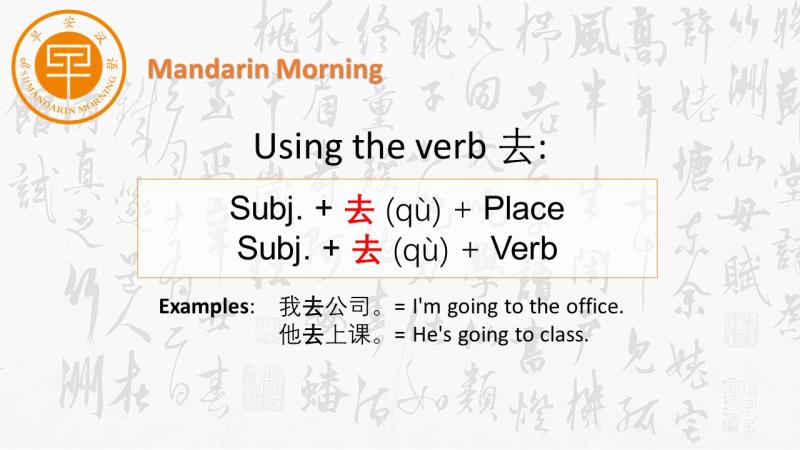You can use 去 (qù) whenever you have somewhere to go. It's pretty easy to get a handle on this verb; the only trick is getting used to not needing a word for "to" before the destination. 去 (qù) with Just a Place The verb 去 (qù) means "to go," and is an easy way to talk about going to places. Structure: Subj. + 去 + [Place] Notice that you don't need a word to express "to." Examples: 我去公司。(wǒ qù gōngsī) = I'm going to the office. 你去洗手间吗?(nǐ qù xǐshǒujiān ma) = Are you going to the restroom? 下午我会去超市。(xiàwǔ wǒ huì qù chāoshì) = In the afternoon, I'll go to the supermarket. 我们现在去公园。(wǒmen xiànzài qù gōngyuán) = We're going to the park now. 晚上我们去酒吧。你去吗?(wǎnshang wǒmen qù jiǔbā. Nǐ qù ma) = Tonight we're going to the bar. Are you going?  去 (qù) with a Verb Instead of a place, 去 (qù) can also be followed by some sort of action. The structure then means "go to do (something)," and "go and do (something)." Structure: Subj. + 去 + Verb Examples: 我去工作。(wǒ qù gōngzuò) = I'm going to work. 他去上课。(tā qù shàngkè) = He's going to class. 你想去旅行吗?(nǐ xiǎng qù lǚxíng ma) = Would you like to go travel? 我们去吃饭吧。(wǒmen qù chīfàn ba) = Let's go eat. 九点我们去买。(jiǔ diǎn wǒmen qù mǎi) = At 9 o'clock, we'll go buy it.  |